Tariff battle slicing US meat exports


Iowa-based Heartland Brothers started business a few years ago with the intention to bring high-quality American meat - pork and beef - to tables in China.
However, the current trade war between the US and China has forced the company to change its trajectory by slashing half of its pork exports. The company now turns to Spain to source pork and Australia for beef.
"We had negotiated deals with some US farmers to export US beef to China, but we have to abandon those deals," said John Zhong, co-founder and CEO of Heartland Brothers.
His company had to negotiate new deals with Australian farmers and now sends beef to China from Australia instead of the US.
In response to US tariffs on Chinese goods, China levied a 25 percent tariff on US pork in April and another 25 percent in July. Factoring in prior tariffs, the tax on US pork to China is now 62 percent.
The Heartland Brothers focus on exporting premium American Berkshire pork to China, but the new tariffs rendered the pork business unprofitable.
Zhong said the company reduced shipments of Berkshire Pork by half so as to keep the supply available to China, because his company is the only one exporting the specialty pork there.
By contrast, many major commodity traders stopped selling US pork to China altogether because no one was making a profit.
Zhong said the company is not only losing revenue on pork exports but also could wind up losing major clients.
"Our long-term clients have no confidence in the China-US trade relations and may choose not to buy our products anymore. This is why we are now going to Spain to look for Berkshire pork," Zhong said.
According to data from the US Meat Export Federation, pork exports to the Chinese mainland/Hong Kong region were well below year-ago levels in May, due in part to the additional 25 percent tariff imposed by China on April 2.
May export volume to Chinese mainland/Hong Kong was down 31 percent from a year ago. For January through May, export volume to Chinese mainland/Hong Kong was 18 percent below last year.
While more recent data are not yet available from the federation, the US Department of Agriculture reported zero pork exports to China in recent weeks after the 25 percent tariff went into effect early this month.
The effect of the pork tariffs also is detailed in a Wall Street Journal report showing that meat is piling up in cold-storage warehouses, fueled by a surge in supplies and trade disputes.
The WSJ report said that federal data are expected to show a record level of beef, pork, poultry and turkey stockpiles, rising above 2.5 billion pounds.
Since the end of May, lean hog futures at the Chicago Mercantile Exchange have dropped 14 percent.
Zhong said his company is processing some of the pork in China to recoup some profits.
"We have lost a lot of money in all of this. I hope the US government will give us some financial support," Zhong said.

































